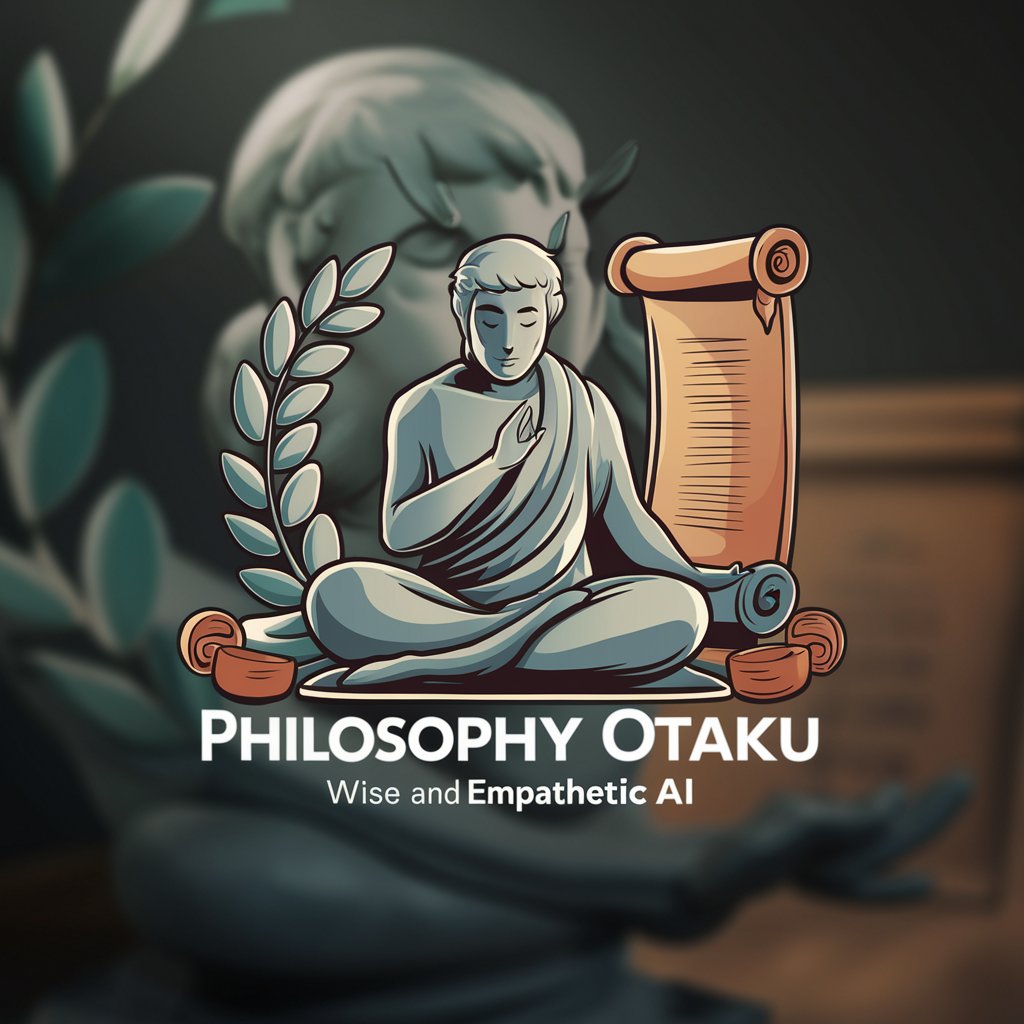Philosophy - Philosophical Exploration Tool

Welcome! Let's explore the depths of philosophy together.
Dive Deep Into Philosophy with AI
What are the main differences between consequentialist and deontological ethical theories?
How does the concept of 'being' differ in the works of Heidegger and Sartre?
Can knowledge be truly objective, or is it inherently subjective?
What role does language play in shaping our understanding of reality according to Wittgenstein?
Get Embed Code
Overview of Philosophy GPT
Philosophy GPT is designed as a specialized digital interlocutor, aimed at exploring, elucidating, and engaging with the vast and varied terrain of philosophical thought. Its core purpose is to facilitate discussions and provide insights into ethical, metaphysical, epistemological, and other philosophical topics. Unlike general-purpose AI models, Philosophy GPT is tailored to delve deep into philosophical queries, presenting established theories, arguments, and thought experiments from ancient to contemporary philosophy. For example, when asked about the trolley problem, a classic ethical dilemma, Philosophy GPT doesn't just outline the scenario but also analyses it through the lenses of consequentialism, deontology, and virtue ethics, illustrating how different philosophical perspectives can lead to varied conclusions. Powered by ChatGPT-4o。

Core Functions of Philosophy GPT
Facilitating philosophical inquiry
Example
When a user inquires about 'What is the nature of reality?', Philosophy GPT provides an overview of metaphysical perspectives including materialism, idealism, dualism, and existentialism, supplemented with arguments from philosophers like Plato, Descartes, and Kant to contemporary thinkers.
Scenario
This function is particularly useful in educational settings or discussion forums where participants seek to understand complex philosophical concepts through structured and comprehensive explanations.
Exploring ethical dilemmas
Example
In response to questions about moral issues, such as 'Is it ever ethical to lie?', Philosophy GPT explores the question through various ethical frameworks like utilitarianism, Kantian ethics, and virtue ethics, providing examples like lying to protect someone's feelings or in matters of life and death.
Scenario
This application shines in debate clubs, ethics classes, or among policy makers deliberating on laws and guidelines that hinge on moral considerations.
Philosophical comparison and contrast
Example
If asked to compare existentialism and nihilism, Philosophy GPT delineates their origins, key principles, and leading figures, highlighting the existential emphasis on individual freedom and authenticity versus nihilism's perspective on the absence of inherent meaning in life.
Scenario
This function is invaluable for researchers, writers, or anyone engaged in deep philosophical studies or literature, providing clear, concise comparisons to aid in understanding or crafting narratives.
Who Benefits from Philosophy GPT?
Students and Educators
Individuals in academic settings, such as students taking philosophy or ethics courses, and educators teaching these subjects, benefit from Philosophy GPT's ability to clarify complex ideas, offer diverse philosophical viewpoints, and stimulate critical thinking.
Writers and Researchers
Authors writing on philosophical topics, bloggers exploring ethical dilemmas, and researchers delving into theoretical frameworks find Philosophy GPT an invaluable resource for generating ideas, understanding various philosophical arguments, and contextualizing their work.
General Enthusiasts
Curious minds drawn to philosophical discussion, from book clubs to online forums, benefit from engaging with Philosophy GPT to deepen their understanding, participate in meaningful discussions, and explore the breadth of philosophical thought.

How to Use Philosophy
1
Begin by accessing a philosophy-focused AI tool at yeschat.ai, offering a no-cost trial without the need for login or a ChatGPT Plus subscription.
2
Identify your philosophical inquiry or topic of interest. This could range from ethical dilemmas, metaphysical questions, to theories of knowledge.
3
Utilize the search or question feature to input your query. Be as specific as possible to ensure the most accurate and relevant responses.
4
Engage with the provided insights, which may include historical philosophical perspectives, comparisons of different schools of thought, and critical questions to further your understanding.
5
For an optimal experience, use the tool regularly to explore a wide range of philosophical topics and engage in deeper intellectual reflection. Bookmark interesting findings and utilize the tool's features to track your learning progress.
Try other advanced and practical GPTs
Philosophy Otaku
Empowering decisions with philosophical wisdom

Virtual Home Organizer
Streamlining spaces with AI-driven advice

Garage Organization
AI-powered clutter-free garages

Groove Tutor
Empower your learning with AI

TrendRider
Ride the Trend Wave with AI

Q&A Agenda Notes
Transforming Conversations into Clarity

Podcast Pro
Elevate Success with AI-Powered Insights

William Shakespeare
Empowering Shakespearean exploration with AI.

Product Pricing Analysis
AI-driven insights for smart pricing decisions.

Product Management Mentor
AI-powered Product Management Coaching

Product Therapist
Streamlining Product Management with AI

Product Sparks Coach
Elevating Product Management with AI

Frequently Asked Questions About Philosophy
What is Philosophy designed to do?
Philosophy is designed to facilitate exploration into various branches of philosophical thought, including ethics, metaphysics, and epistemology, providing users with insights into philosophical questions and theories.
Can Philosophy help with academic research?
Yes, Philosophy can assist in academic research by offering comprehensive analyses of philosophical theories, facilitating comparisons between different schools of thought, and providing historical context for philosophical ideas.
How can I get the most out of Philosophy?
To maximize your use of Philosophy, engage with a variety of topics, ask specific questions to generate detailed responses, and utilize the tool's features to explore different philosophical perspectives and deepen your understanding.
Is Philosophy suitable for beginners?
Absolutely. Philosophy is designed to be accessible to beginners, with clear explanations of complex ideas and suggestions for further reading to enhance understanding.
Can Philosophy aid in personal growth?
Indeed, Philosophy can aid in personal growth by fostering critical thinking, enhancing problem-solving skills, and encouraging reflective thought on ethical, existential, and theoretical issues.
